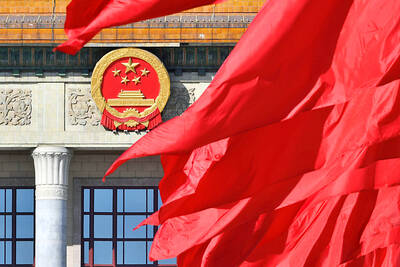Chinese authorities are seeking to whitewash the alleged crimes of former Chongqing party head Bo Xilai (薄熙來) and protect his political backers by shifting the blame to his wife, who will be tried for murder, activists say.
In the biggest political scandal to hit China in decades, Bo’s wife, Gu Kailai (谷開來), has been charged with homicide over the death of British business associate Neil Heywood in November.
The evidence against her is “irrefutable and substantial,” state media said last week, indicating the authorities are intent on settling the case as soon as possible.
However, observers said it was much less clear whether wider corruption allegations against Bo would ever be examined in a court of law.
Bo, the son of a revered Communist revolutionary, won national fame with a draconian crackdown on criminal elements and a Maoist-style “red revival” campaign in Chongqing when he was Chinese Communist Party (CCP) party secretary for the city.
His fall from grace began when his former right-hand man, police chief Wang Lijun (王立軍), fled to a US consulate to seek asylum, after reportedly confronting Bo with information related to Heywood’s murder.
Bo’s rapid downfall was hugely embarrassing for the Chinese Communist Party (CCP) and exposed deep divisions at its top level.
Analysts and political activists say the party will be keen to see the back of the scandal and neutralize the risk it could pose to other senior figures, before a once-in-a-decade leadership transition due in the autumn.
While Bo is being probed for corruption, observers say that Gu’s impending trial will now take up the limelight.
“It is the same old thing, they are continuing to cover things up,” said former top CCP leader Bao Tong (鮑彤), who was purged in 1989 for his role in the Tiananmen democracy protests.
“They will put on a political farce, a fake show, and then when another scandal erupts, they do it all over again,” the 79-year-old said.
There is speculation that the case could go to court as soon as early next month, but no date has been confirmed.
“Right now there is a lot that we don’t know, because there has been no transparency in the case ... and there are a lot of things [the party] does not want people to know about,” prominent rights activist Hu Jia (胡佳) said.
“If there is a political struggle inside the party, then they will become even more closed and non-transparent. They won’t reach a decision through the judiciary, but it will be a party decision based on political considerations,” he added.
Hu said the party’s powerful Politics and Law Commission, along with top leaders, including Chinese President Hu Jintao (胡錦濤), will likely decide the fates of Bo and Gu.

US PUBLICATION: The results indicated a change in attitude after a 2023 survey showed 55 percent supported full-scale war to achieve unification, the report said More than half of Chinese were against the use of force to unify with Taiwan under any circumstances, a survey conducted by the Atlanta, Georgia-based Carter Center and Emory University found. The survey results, which were released on Wednesday in a report titled “Sovereignty, Security, & US-China Relations: Chinese Public Opinion,” showed that 55.1 percent of respondents agreed or somewhat agreed that “the Taiwan problem should not be resolved using force under any circumstances,” while 24.5 percent “strongly” or “somewhat” disagreed with the statement. The results indicated a change in attitude after a survey published in “Assessing Public Support for (Non)Peaceful Unification

The CIA has a message for Chinese government officials worried about their place in Chinese President Xi Jinping’s (習近平) government: Come work with us. The agency released two Mandarin-language videos on social media on Thursday inviting disgruntled officials to contact the CIA. The recruitment videos posted on YouTube and X racked up more than 5 million views combined in their first day. The outreach comes as CIA Director John Ratcliffe has vowed to boost the agency’s use of intelligence from human sources and its focus on China, which has recently targeted US officials with its own espionage operations. The videos are “aimed at

SECURITY: Grassroots civil servants would only need to disclose their travel, while those who have access to classified information would be subject to stricter regulations The government is considering requiring legislators and elected officials to obtain prior approval before traveling to China to prevent Chinese infiltration, an official familiar with national security said yesterday. President William Lai (賴清德) in March announced 17 measures to counter China’s growing infiltration efforts, including requiring all civil servants to make trips to China more transparent so they can be held publicly accountable. The official said that the government is considering amending the Act Governing Relations Between the People of the Taiwan Area and Mainland Area (臺灣地區與大陸地區人民關係條例) to require all civil servants to follow strict regulations before traveling to China.

‘MISGUIDED EDICT’: Two US representatives warned that Somalia’s passport move could result in severe retaliatory consequences and urged it to reverse its decision Minister of Foreign Affairs Lin Chia-lung (林佳龍) has ordered that a special project be launched to counter China’s “legal warfare” distorting UN Resolution 2758, a foreign affairs official said yesterday. Somalia’s Civil Aviation Authority on Wednesday cited UN Resolution 2758 and Mogadishu’s compliance with the “one China” principle as it banned people from entering or transiting in the African nation using Taiwanese passports or other Taiwanese travel documents. The International Air Transport Association’s system shows that Taiwanese passport holders cannot enter Somalia or transit there. The Ministry of Foreign Affairs (MOFA) protested the move and warned Taiwanese against traveling to Somalia or Somaliland